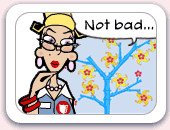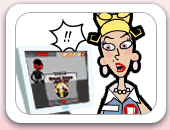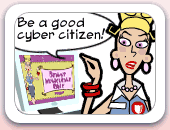Shortcuts:.
Social Networking and Growing an Online Reputation
Cyberspace Communication Database
Learn more about Safe Communications in Betty's Training Missions:
and the blog archives:
Welcome to Betty's Cyberspace Communications page! From chat rooms to social networks and online games to text messages, there are tons of ways to communicate with people in Cyberspace. Communicating in Cyberspace can be a lot of fun and a great way to keep in touch with your friends and family. But it can also be very dangerous if you share too much information with the wrong sorts of people.
Communicating in Cyberspace
Here you will find information about how to communicate safely in Cyberspace and behave like a good cyber citizen.
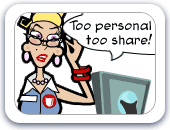
Protecting Your Information
Learn more about your Personal Information and why you must protect it.
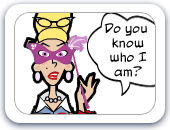
Communicating Safely
Tips for protecting yourself and your friends when communicating online.
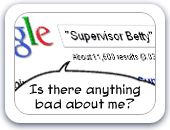
Managing Your Identity
You don't have to be just an observer of your online identity, take charge of it!
Social Networking and Growing your Online Reputation
Your online reputation is what others think of you in cyberspace. It can be influenced by what you share and what others say about you. As you join social networks, play multiplayer games, publish blogs and tweets, and share pictures and videos, your online and offline identities become merged, and your online reputation (whether good or bad) makes an impact on your life, both online and offline.
Betty's mini training mission on Growing an Online Reputation encourages you to take charge of protecting and developing your online reputation by being smart about what you share and how you use privacy settings.
Cyber Bullying
Cyber bullying is when someone uses the Internet to harass, intimidate, embarrass or demean others. Cyber bullies may post embarrassing information on webpages, trick people into giving out personal information, send threatening or cruel messages or emails or pretend to be somebody else to send mean or embarrassing messages.
Betty's Cyber Bullying page has tips for dealing with cyber bullying if you ever encounter it and strategies for protecting yourself from cyber bullies.
Netiquette
Netiquette is the etiquette of the Internet. Etiquette is defined as "the conduct or procedure required by good breeding or prescribed by authority to be observed in social or official life," so, in other words, good manners!
Being friendly and polite shows good manners both offline and online, but because you can't see the other person and words last in Cyberspace, there are also some special manners you should also follow online. Betty's Guide to Netiquette has tips for navigating the tricky waters of Cyberspace manners.
Cyberspace Communication Database
These and other cyber definitions can be found in the Cyberpedia.
L
L33tspeak
A type of chat slang that is commonly used among gamers. It comes from the word “elite” and is a special form of writing where combinations of numbers and characters are used to replace alphabet letters. For example, 3 replaces the letter E and 4 replaces the letter A, so the phrase "1 4m l33t" stands for “I am elite.”
Learn more: Internet Chat Slang
LOL
An acronym for Laugh Out Loud.
Learn more: Internet Chat Slang
M
Microblogging
Blog posts that are no longer than 200 characters. Twitter is a popular microblogging service.
Learn more: Cyberspace Communications
Misinformation
Incorrect or false information.
Learn more: Evaluating the Information
MMOG
Short for Massively Multiplayer Online Game, an online video game capable of supporting thousands of players at the same time. They have persistent worlds, meaning it continues to exist and evolve when a player isn't playing it.
Learn more: Online Gaming Netiquette
Moderator
People who have the authority to enforce the rules and terms of use in games, forums and chat rooms.
Learn more: Communicating Safely
N
Netiquette
Rules for acting respectful and polite in cyberspace. These rules help keep the Internet safe and friendly.
Learn more: Betty's Guide to Netiquette
O
Offline Identity
Your identity in real life, who you really are. It is made up of your personal information and it is very risky to use your offline identity in Cyberspace.
Learn more: Protecting Your Personal Information
Online Identity
Your identity in cyberspace, who you are on the Internet. It is made up of your online alias, your avatar, things you post, and information you enter into online profiles. A safe online identity doesn't reveal your personal information.
Learn more: Managing Your Online Identity
P
P2P Network
Parental Controls
Software that your parent or trusted adult can use to help make your Internet experience more safe. These controls can let them set which games you can play, which programs you can use, which websites you can visit, and when. While this may sound like they are trying to control your online life, these controls are really to protect you from stumbling across content that might make you afraid or uncomfortable.
Learn more: Computer and Device Defense
Peer-to-Peer Network
A type of network that allows computer users to share everything from files to network bandwidth with one another. A user must install software to access the network, then they can search through and download the files of any computer on the network. They can be risky because they give others direct access to your files, and many Peer-to-Peer programs don’t allow their users to have a firewall in place so they can leave your computer open for a malware infection.
Learn more: Computer and Device Defense
Personal Information
Any information about you that can be used to identify you or find out where you are. This includes not only the obvious things like your full name and your address, but less-obvious things, like your car's license plate number or what sports team you play on.
Learn more: Protecting Your Information.
Personal Information Filter
A checklist of questions to ask yourself before posting something in cyberspace to decide if it is too personal to share.
Learn more: Protecting Your Information
Photo Sharing Site
A type of social networking site that you can use to manage and share your photos. Flickr and Picasa are popular photo sharing sites. Also see Video Sharing Site
Learn more: Communicating Safely
Privacy Settings
Settings used to adjust who can see your content on a website, forum or profile.
Learn more: Managing Your Online Identity
Profile
A collection of information about you, like where you go to school and your hobbies and interests. Some websites, like social networking sites and forums, allow you to fill out an online profile so that other users can find out more about you. Users must walk a fine line when filling out a profile to make sure they aren't revealing anything too personal or risky.
Learn more: Protecting Your Information
R
RSS
Short for Real Simple Syndication, a format for web feeds, which are collections of the latest content updates made to a website, such as a blog. You can use newsreader or aggregator software to collect, organize, and read through RSS feeds. Many websites have RSS buttons that you just click on to subscribe to their RSS feed.
S
Screename
See Username.
Slang
The informal use of a word so that it means something different. For example, using "cool" to describe something that is impressive or good.
Learn more: Internet Chat Slang
SMS
Short for Short Message Service, the standard format that most phones use to send text messages. Today, many mobile phone providers also offer email and alert services over SMS.
Learn more: Cyberspace Communications
Social Networking Site
A website that brings people together to keep in touch, share news, links and pictures, and even make new friends. Social Network users have a profile and a group of friends that they can share things with.
Learn more: Communicating Safely
Spoiler
Revealing a part of the plot of a television show, book, movie, or play. If you are going to reveal a spoiler in cyberspace, it's good netiquette to warn people before they read it by writing ****SPOILER ALERT**** before and ****END SPOILERS**** after it.
Learn more: Betty's Guide to Netiquette
T
Terms of Use
A list of guidelines given by a company that provides a service, such as a social networking site or an online game. These guidelines are meant to inform you of what behaviors will get your account banned from the site or game, such as cyber bullying, posting forbidden content, or using a fake identity to create your account.
Learn more: Betty's Guide to Netiquette
Text Message
A brief written message sent from one mobile device or computer to another. The sender of a text message is called a "texter" and sending text messages is called "texting".
Learn more: Cyberspace Communications
Troll
See Forum Troll.
Trusted Adult
An adult that you trust, like a parent or teacher, whom you can talk to about anything weird or icky that you encounter in cyberspace. Your trusted adult can help you solve problems and come up with strategies for keeping yourself and your devices safe.
Learn more: Communicating Safely
U
Username
A name you use to identify yourself on a computer or website. Your username is a major part of your online identity.
Learn more: Creating a Safe Online Identity
V
Video Chatting
Chatting on the Internet using a webcam and a video chat program.
Learn more: Cyberspace Communications
Video Networking Site
A type of social networking site that you can use to manage and share your videos. YouTube is a popular video sharing site. Also see Photo Sharing Site
Learn more: Communicating Safely
Voice Chatting
Using a microphone or headset to chat with other people in cyberspace. You can voice chat with VOIP software and sometimes directly through a program, such as an online game. Many online gamers use voice chatting while playing in a group to stay organized.
Learn more: Cyberspace Communications
VOIP
Short for Voice over Internet Protocol, the rules and formats that apply to transmitting voices over the Internet, so that it can be used as a telephone. It is usually less expensive to call people long distance with VOIP software, such as Skype.
Learn more: Cyberspace Communications
W
Web 2.0
A term for the current generation of the Internet, the "second" version that allows people to have two-sided communication and collaboration. In the "first" version of the Internet, information was delivered in a one-sided way, someone would create a website and you could look at it but you couldn't comment on it or share it easily with your friends. Examples of Web 2.0 trends are socializing on social networking sites, running software through the web browser, publishing blogs that other people can comment on, and sharing media on photo and video sharing sites.
Weirdo Strangers
See Cyber Predator.
A
Acronym
A type of Internet chat slang, acronyms are abbreviated versions of phrases like BRB for Be Right Back, LOL for Laugh Out Loud, and FYI for For Your Information. They are much faster than typing out the entire phrase, and can be very useful when text messaging.
Learn more: Internet chat slang
Alias
See Username.
Anonymous
Without a name. If someone is being anonymous in cyberspace, they never use their real name and might not even use an Alias.
Avatar
A digital representation of a user or game player. Avatars can be an icon or a 3-D character and are used in online games and on forums and websites. The word comes from the Sanskrit word avatara, meaning "incarnation" or the earthly form of a spirit or god (Source: Wikipedia).
Learn more: Managing Your Online Identity
Away Message
In Instant Messenger programs, a message you can leave for people trying to chat with you when you're not at the computer. It can be a fun way to let your friends know what you are doing, but can also be risky if you share too much personal information or make it visible to the wrong people.
Learn more: Protecting Your Information
B
Blog
Short for "Web log," a personal website that is usually used to keep a journal or diary. Some blogs focus on a specific topics like travel or politics. The author of a blog is called a "blogger."
Bookmark
Also called Favorites, links to websites that you can store in your web browser so that you do not have to type in the URL each time you want to visit a site.
BRB
An acronym for Be Right Back.
Learn more: Internet Chat Slang
Buddy List
See Friends List
Bulletin Board
See Forum.
C
Chat Room
A virtual room in cyberspace where people go to "chat," or talk to other people.
Learn more: Cyberspace Communications
Chat Slang
Slang used when chatting in cyberspace, where you use shorter words or just letters to stand for other words. For example, you may use "r" instead of "are," or "cuz" instead of "because."
Learn more: Internet Chat Slang
Children's Online Privacy Protection Act (COPPA)
An act created by the United States Federal Trade Commission (FTC) to protect the personal information of children in cyberspace. In order to comply, websites that collect information from children under the age of 13 (like for registering an account) must require a parent's permission before they do so.
Learn more: Children's Online Privacy Protection Act (COPPA)
Cold Shoulder
To ignore someone, one way to protect yourself from cyber criminals.
Learn more: Protecting Your Personal Information
Content Filters
Also known as censorware or web filtering software, used in web browsers to control what content or websites can be viewed. They are frequently used by parents, schools, and companies to limit what people can access from their computers.
Cyber Bully
Someone who bullies others in Cyberspace.
Also see Cyber Bullying
Cyber Bullying
Using the Internet to harass, intimidate, embarrass, or put down others. This can include posting embarrassing information on web pages, tricking people into giving out personal information, sending threatening or cruel messages or emails, or pretending to be somebody else to send mean or embarrassing messages.
Learn more: Cyber Bullying
Cyber Predator
Someone who uses the Internet to find young children, often because they want to meet the child in person and hurt them.
Learn more: Communicating Safely
Cyber Stalking
An aggressive form of cyber bullying, using the Internet to follow, harass, or contact others in an unwanted manner. Like offline stalking, cyber stalking is a threatening behavior and is illegal.
Learn more: Cyber Crimes and Criminals
D
Defamation
Saying things that are not true in order to harm someone's reputation. Defamation is a method sometimes used by cyber bullies and is illegal.
Learn more: Cyber Bullying
E
Ego Surfing
Using a search engine to look up your own name. Ego surfing is a good way to check in on your online identity and find out any information about you on the web.
Learn more: Managing Your Identity
Electronic mail that is sent over the Internet. You can send email messages to anyone who has an email address.
Email Address
An electronic address where an email can be delivered. Usually it has this format: username@domain.ext, and should be read as "username at domain dot ext."
Emoticon
A type of chat slang, a combination of text characters that resembles a facial expression. Emoticons are used in cyberspace communication to show the mood of the person who is speaking. For example, :-) is a happy face and
:-( is a sad face.
Learn more: Internet Chat Slang
Encryption
Transforming text or data into an unreadable form so that only people with access to the right software can "decrypt", or decode it. Encrypting data makes it harder for cyber criminals to use it for cyber crimes.
Learn more: Setting Up Your Defenses
F
Flag
Marking something or someone as suspicious or inappropriate. Some social networking sites, forums and chat rooms give users the ability to flag posts or other people so the moderators can investigate further.
Learn more: Communicating Safely
Flame War
A hostile argument among several people as a result of flaming.
Learn more: Cyber Bullying
Flaming
Posting messages that are deliberately mean and insulting. Flaming is a type of cyber bullying and can sometimes even grow into a flame war.
Learn more: Cyber Bullying
Forum
Also called a bulletin board or message board, a website where people can have discussions about topics like their favorite video game or sports team. Unlike a chat room, where conversation takes place in real-time, these conversation "threads" become part of the website and can be viewed by anyone with access to the forum for as long as the site keeps them up. In this way, they are similar to a blog or comments posted on a social networking site.
Learn more: Cyberspace Communications
Forum Troll
People who post rude or mean comments in forums for the sole purpose of upsetting or insulting people. The name "troll" comes from the fishing term "trolling" or trailing bait through a certain spot hoping for a bite. Trolls can be relatively easy to spot; they will often post things anonymously that have no relevance to the conversation or demonstrate a bias.
Learn more: Communicating Safely
Friends List
The list of friends that you have accepted into your social network or added to an instant messenger program or online game so that you can stay in contact with them.
Learn more: Communicating Safely
G
Griefer
Someone who acts like a cyber bully or asks for your account information in an online game.
Learn more: Online Gaming Netiquette
H
Hoax
A deliberate attempt to deceive or trick someone into believing or accepting that something is real or true, when the hoaxster knows it is not. A hoax is similar to fraud, but a hoaxster doesn't intend to gain anything from the victim or harm them.
Learn more: Evaluating the Information
I
Icky Feeling
An uncomfortable feeling you get when you see something inappropriate or scary.
Instant Messaging
A way to chat with others in cyberspace using text messages that appear almost instantly. Instant message conversations are usually just between two people.
Learn more: Cyberspace Communications
Internet Addiction
When you become so obsessed with being in cyberspace that it interferes with your normal life. Internet addicts choose to make the Internet the most important thing in their lives, more important than family, offline friends and school. Their unhealthy behavior causes stress for the people around them and can ruin relationships.


